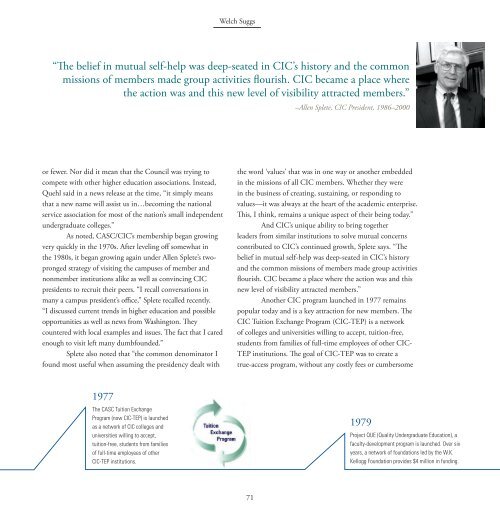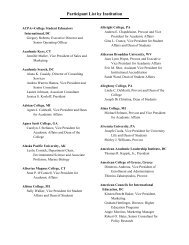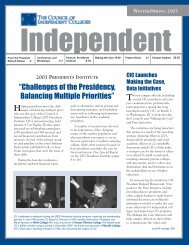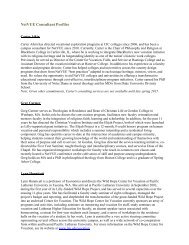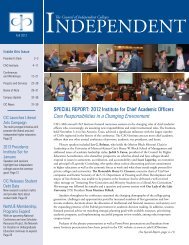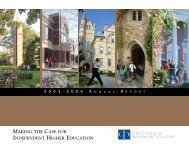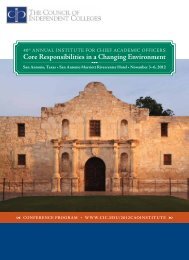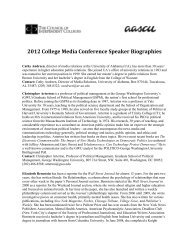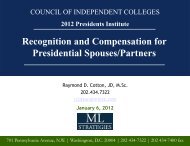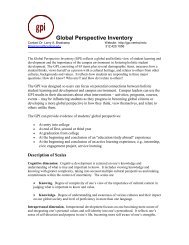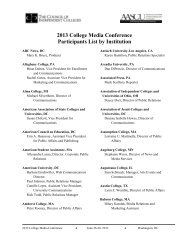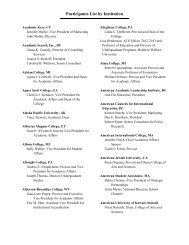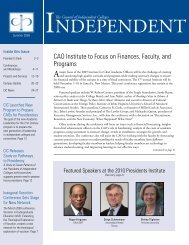Meeting the Challenge: - The Council of Independent Colleges
Meeting the Challenge: - The Council of Independent Colleges
Meeting the Challenge: - The Council of Independent Colleges
Create successful ePaper yourself
Turn your PDF publications into a flip-book with our unique Google optimized e-Paper software.
Welch Suggs<br />
“<strong>The</strong> belief in mutual self-help was deep-seated in CIC’s history and <strong>the</strong> common<br />
missions <strong>of</strong> members made group activities flourish. CIC became a place where<br />
<strong>the</strong> action was and this new level <strong>of</strong> visibility attracted members.”<br />
–Allen Splete, CIC President, 1986–2000<br />
or fewer. Nor did it mean that <strong>the</strong> <strong>Council</strong> was trying to<br />
compete with o<strong>the</strong>r higher education associations. Instead,<br />
Quehl said in a news release at <strong>the</strong> time, “it simply means<br />
that a new name will assist us in…becoming <strong>the</strong> national<br />
service association for most <strong>of</strong> <strong>the</strong> nation’s small independent<br />
undergraduate colleges.”<br />
As noted, CASC/CIC’s membership began growing<br />
very quickly in <strong>the</strong> 1970s. After leveling <strong>of</strong>f somewhat in<br />
<strong>the</strong> 1980s, it began growing again under Allen Splete’s twopronged<br />
strategy <strong>of</strong> visiting <strong>the</strong> campuses <strong>of</strong> member and<br />
nonmember institutions alike as well as convincing CIC<br />
presidents to recruit <strong>the</strong>ir peers. “I recall conversations in<br />
many a campus president’s <strong>of</strong>fice,” Splete recalled recently.<br />
“I discussed current trends in higher education and possible<br />
opportunities as well as news from Washington. <strong>The</strong>y<br />
countered with local examples and issues. <strong>The</strong> fact that I cared<br />
enough to visit left many dumbfounded.”<br />
Splete also noted that “<strong>the</strong> common denominator I<br />
found most useful when assuming <strong>the</strong> presidency dealt with<br />
<strong>the</strong> word ‘values’ that was in one way or ano<strong>the</strong>r embedded<br />
in <strong>the</strong> missions <strong>of</strong> all CIC members. Whe<strong>the</strong>r <strong>the</strong>y were<br />
in <strong>the</strong> business <strong>of</strong> creating, sustaining, or responding to<br />
values—it was always at <strong>the</strong> heart <strong>of</strong> <strong>the</strong> academic enterprise.<br />
This, I think, remains a unique aspect <strong>of</strong> <strong>the</strong>ir being today.”<br />
And CIC’s unique ability to bring toge<strong>the</strong>r<br />
leaders from similar institutions to solve mutual concerns<br />
contributed to CIC’s continued growth, Splete says. “<strong>The</strong><br />
belief in mutual self-help was deep-seated in CIC’s history<br />
and <strong>the</strong> common missions <strong>of</strong> members made group activities<br />
flourish. CIC became a place where <strong>the</strong> action was and this<br />
new level <strong>of</strong> visibility attracted members.”<br />
Ano<strong>the</strong>r CIC program launched in 1977 remains<br />
popular today and is a key attraction for new members. <strong>The</strong><br />
CIC Tuition Exchange Program (CIC-TEP) is a network<br />
<strong>of</strong> colleges and universities willing to accept, tuition-free,<br />
students from families <strong>of</strong> full-time employees <strong>of</strong> o<strong>the</strong>r CIC-<br />
TEP institutions. <strong>The</strong> goal <strong>of</strong> CIC-TEP was to create a<br />
true-access program, without any costly fees or cumbersome<br />
1977<br />
<strong>The</strong> CASC Tuition Exchange<br />
Program (now CIC-TEP) is launched<br />
as a network <strong>of</strong> CIC colleges and<br />
universities willing to accept,<br />
tuition-free, students from families<br />
<strong>of</strong> full-time employees <strong>of</strong> o<strong>the</strong>r<br />
CIC-TEP institutions.<br />
1979<br />
Project QUE (Quality Undergraduate Education), a<br />
faculty-development program is launched. Over six<br />
years, a network <strong>of</strong> foundations led by <strong>the</strong> W.K.<br />
Kellogg Foundation provides $4 million in funding.<br />
71


